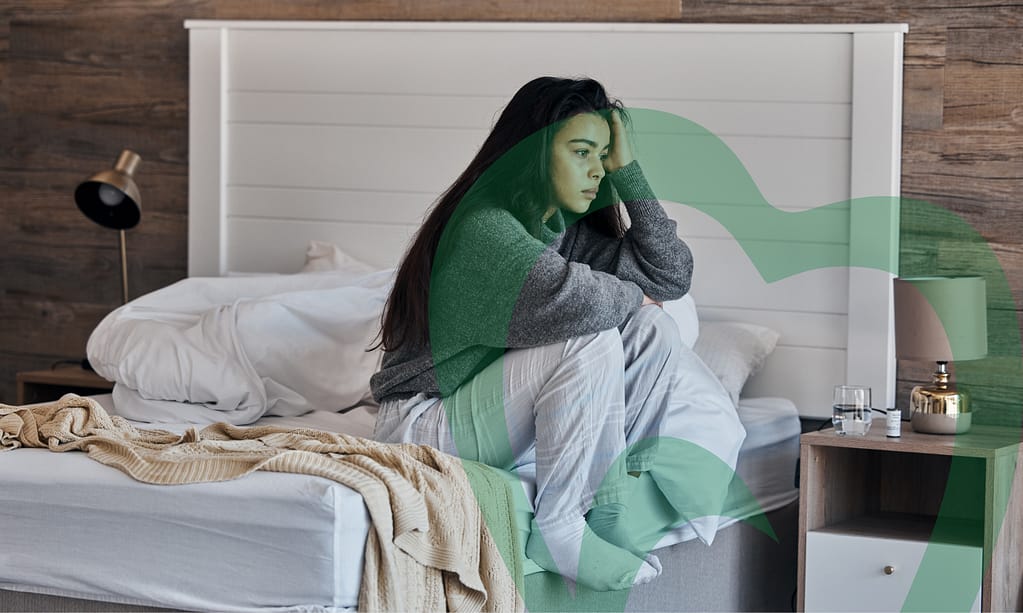A Vicious Cycle: 4 Ways Sleep Apnea and Depression Feed Into Each Other

Sleep apnea and depression are common conditions that can severely impact your quality of life. They often go together, and the specific way they affect your overall health means that they can create a vicious cycle. Each can continue to make the other worse until you find effective treatment.
The connections between sleep apnea and depression.
Sleep apnea and depression are two deeply connected conditions. Research has shown that each is among the most significant coinciding conditions for the other. Patients with sleep apnea are 1.36 times as likely to experience symptoms related to depression.
Both sleep apnea and depression are also intertwined with other whole-body health issues. Many risk factors can increase the risk of both conditions, including medical conditions and lifestyle. Several areas highlight how these two conditions can feed into each other to impact your life.
1. Disrupted Sleep Patterns and Mood Dysregulation
The defining characteristic of obstructive sleep apnea is that the patient wakes suddenly during sleep due to airway obstruction. These brief events tend to happen multiple times throughout the night, severely altering sleep patterns and leading to poor-quality sleep.
This, in turn, causes fatigue and tiredness throughout the day, which is why poor mood regulation and impacted emotional well-being are also common sleep apnea symptoms. They are also among the fundamental indicators of depression. This sleep condition can cause these depressive symptoms to develop or worsen over time.
2. Neurotransmitter Imbalances and Sleep Apnea
The impact of sleep apnea isn’t just about how you feel. It has tangible, measurable impacts on the chemistry that drives your body and mind’s most important systems. That includes the production and reception of neurotransmitters, imbalances of which contribute to a wide range of mental health conditions, including depression.
The pauses in breathing caused by sleep apnea don’t just jolt you awake, but also lower blood oxygen levels. Those low oxygen levels affect many aspects of your health, including your brain. It can impact neural function in a variety of ways, including impeding the development, release, and uptake of neurotransmitters.
3. Fatigue, Cognitive Impairment, and Depressive Symptoms
The frequent waking during sleep caused by sleep apnea can lead to lasting fatigue throughout the day. Along with simply feeling tired, this fatigue also impacts your performance. It can lead to cognitive impairment that can make you struggle at work and even increase your risk of accidents while driving, due to the impact on reaction times.
Fatigue can leave you with low energy and difficulty concentrating. These are both common depressive symptoms and can seriously impact your quality of life. You can find yourself dealing with increasing challenges at work, home, and in social situations due to these symptoms, which can further increase stress, anxiety, and isolation.
4. The Role of Inflammation
Inflammation is a factor that affects many aspects of your overall health. When you suffer from sleep apnea, you deal with low blood oxygen, high blood pressure, and other impacts on cardiovascular function. This leaves you in a constant state of low-intensity inflammation that can impact both physical and mental health.
Depression is one condition chronic inflammation can contribute to. The inflammatory agents in the blood are capable of affecting the brain, leading to a type of neuroinflammation. Many patients with depression also show higher levels of inflammation, which may indicate that it is a significant risk factor for the condition.
Breaking the Cycle: Seeking Treatment and Support
What can you do about sleep apnea and depression? It’s more than just finding methods for how to stop snoring. You need a treatment approach that addresses every aspect of the issue. Both sleep and mental health specialists can help identify potential treatments for your case.
Your dentist can also help. In mild to moderate cases, a custom mouth guard can help alleviate sleep apnea. The oral appliance can stop the airway from relaxing, maintaining airflow without the need for a CPAP machine.
Addressing your sleep apnea and depression can have a major positive impact on your life. More energy throughout the day, greater clarity and concentration, and higher moods can completely change your day-to-day experience.
Sleep Apnea Treatment From Your Dentist in Omaha, NE
If you’re facing the symptoms of depression or sleep apnea, you could benefit from seeking out diagnosis and treatment. A comprehensive approach to your overall health could significantly improve your quality of life. One part of that approach is seeing your trusted dentist at The Tooth Doc. We can help determine whether sleep apnea or other dental issues may be a factor and can offer treatment options such as custom mouth guards that are effective solutions for moderate cases of sleep apnea. Schedule an appointment today to find out more.